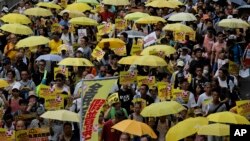Thousands of people, many holding yellow umbrellas, marched in Hong Kong on Sunday to urge lawmakers to vote down Beijing-backed election reforms that sparked huge street protests last year, although the turnout was lower than organizers had been expecting.
With a crucial vote on the southern Chinese financial hub's political future days away, pro-democracy supporters were marching to city government headquarters to rally support for a veto of the government's electoral reform package.
At issue is how Hong Kongers will choose their top leader, who's currently hand-picked by a panel of Beijing-friendly elites. Under the reforms to be put before lawmakers starting Wednesday, the government proposal would allow direct elections for the first time but also require screening of candidates by the panel.
Pro-democracy activists - who caught the world's attention last autumn by occupying parts of the city for 11 weeks to demand greater electoral freedom, turning umbrellas and the color yellow into symbols of their movement - have blasted the proposals as "sham democracy" and called for genuine universal suffrage.
Organizers had said they expected 50,000 people to join Sunday's rally, but turnout appeared to be in the low thousands. People marching in the blazing afternoon heat chanted "I want genuine democracy" and "Veto fake universal suffrage." A large yellow banner mounted on a truck read "The citizens against pseudo-universal suffrage campaign."
Chinese Foreign Ministry spokesman Hong Lei said Friday that the proposal was "in line with Hong Kong's current circumstances, taking into account the interests of and appeals from different social groups and sectors in Hong Kong."
Authorities are bracing for renewed tensions, with both pro-democracy and pro-establishment groups planning to rally outside the government complex. They worry that protesters may try again to occupy roads, though organizers, who hope tens of thousands will turn out for daily rallies this week, have ruled out such action.
Last year's student-led protest movement caught the world's attention with its mostly peaceful street demonstrations. Protesters said China was reneging on a promise that the city's top leader would be chosen through "universal suffrage" agreed when Communist leaders were negotiating the 1997 handover of Hong Kong from Britain.




